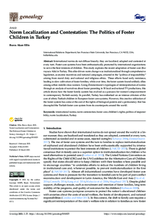Displaying 181 - 190 of 2221
This study explores the recent adaptation of foster care (Koruyucu Aile) in Turkey.
The current study used survival analysis to simultaneously examine the influence of maltreatment characteristics on the risk of receiving a PTSD diagnosis at any time in care following entry into care.
The current study used a resilience framework to describe youth experiences with their caseworkers, examine the association of youth–caseworker relationship quality with school engagement, and to examine the differential impact of youth–caseworker relationships on youth school engagement by level of youth risk (i.e. posttraumatic symptoms).
This research focuses on Somalis living in a large English city where there is a significant shortage of Somali foster carers and adopters despite people of Somali heritage comprising a sizeable proportion of the care and city population.
The present study seeks to examine the goals that carers who are looking after children with emotional and/or behavioural difficulties set at the start of an intervention, the Reflective Fostering Programme, designed to support them.
This study examined the rates and correlates of first and repeat births in a national sample of females emancipating from foster care in the United States.
This study uses a retrospective pre/post design to measure the impact of the pandemic on foster carers’ self-care.
This study uses a retrospective pre/post design to measure the impact of the pandemic on foster carers’ self-care.
This article seeks to echo the voices of 36 children aged 10 to 12 who participated in a therapeutic primary to secondary transition initiative for looked after children.
This article seeks to echo the voices of 36 children aged 10 to 12 who participated in a therapeutic primary to secondary transition initiative for looked after children. Informed by a participatory action research approach, its focus was to facilitate the child’s voice.

